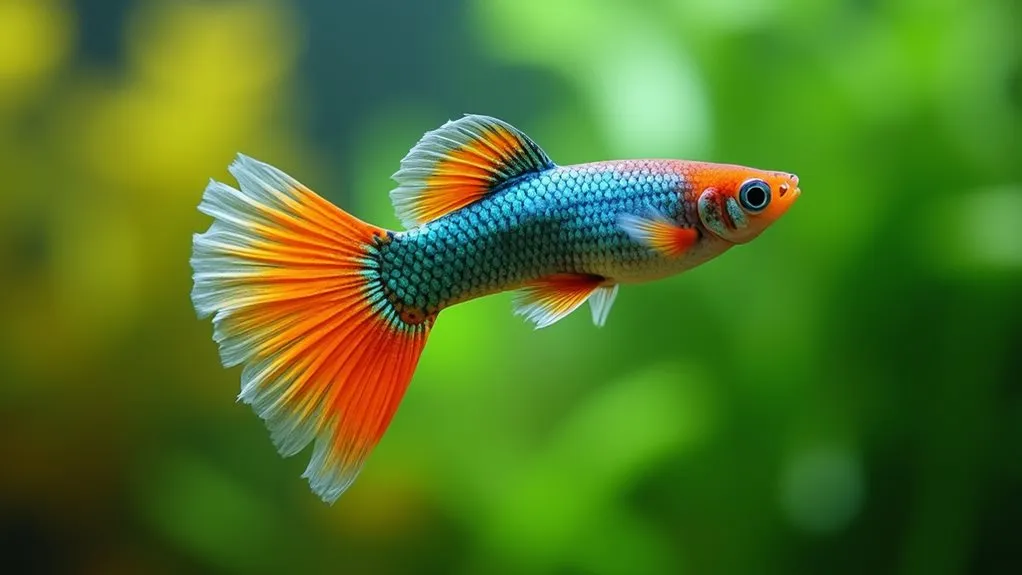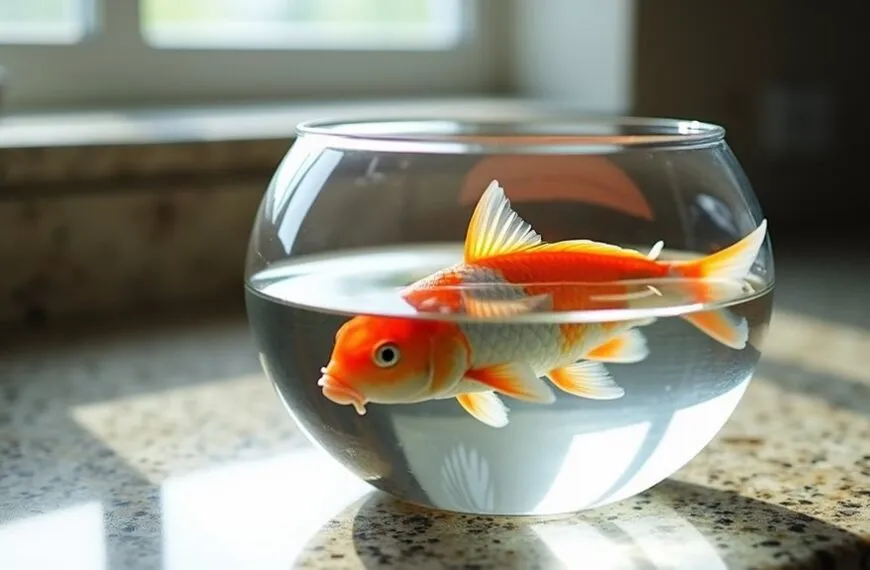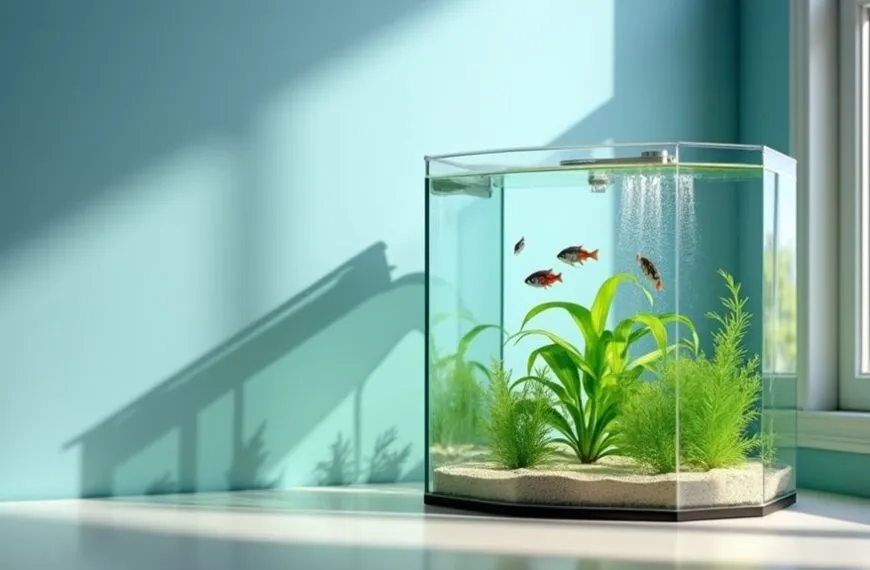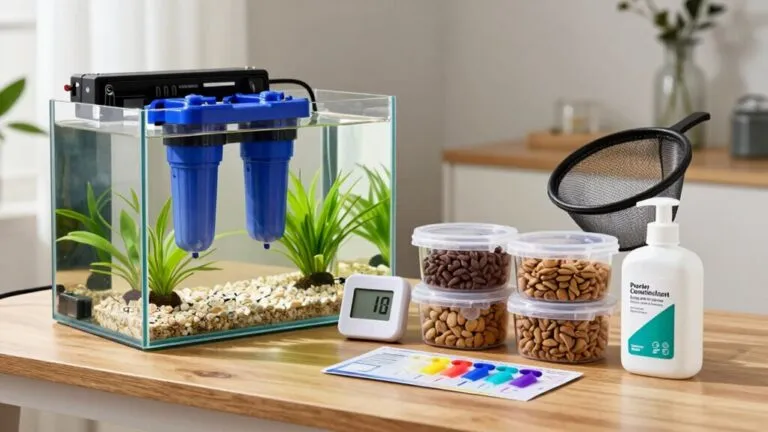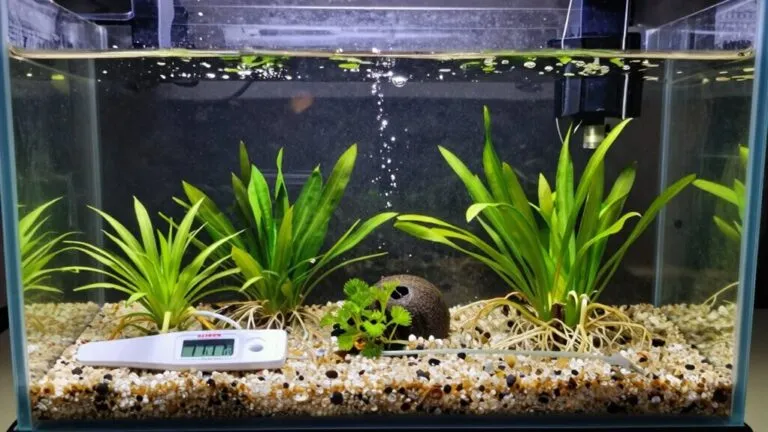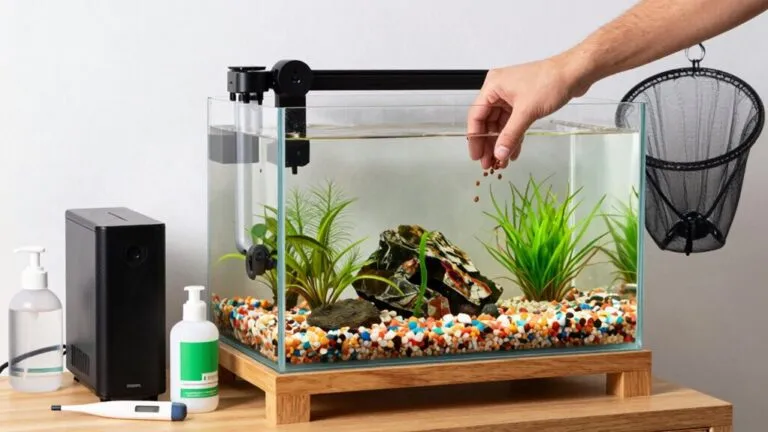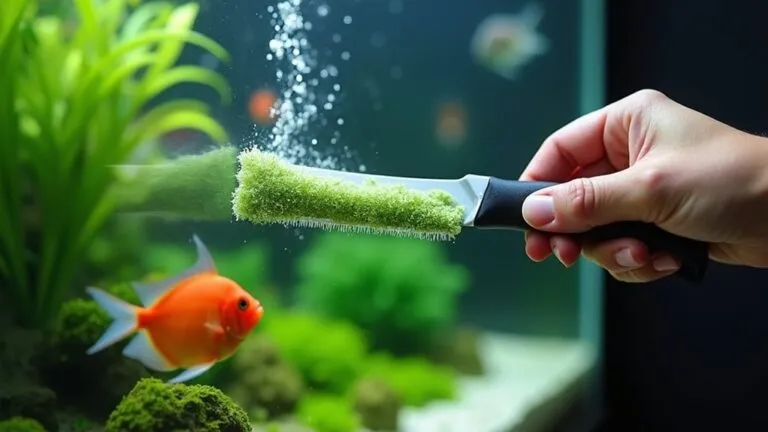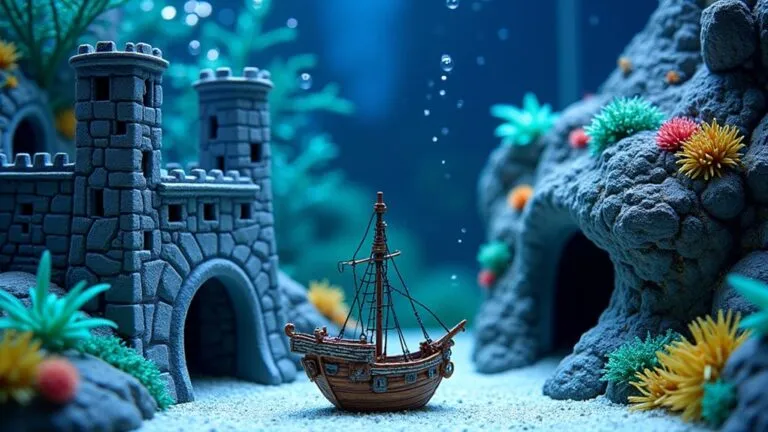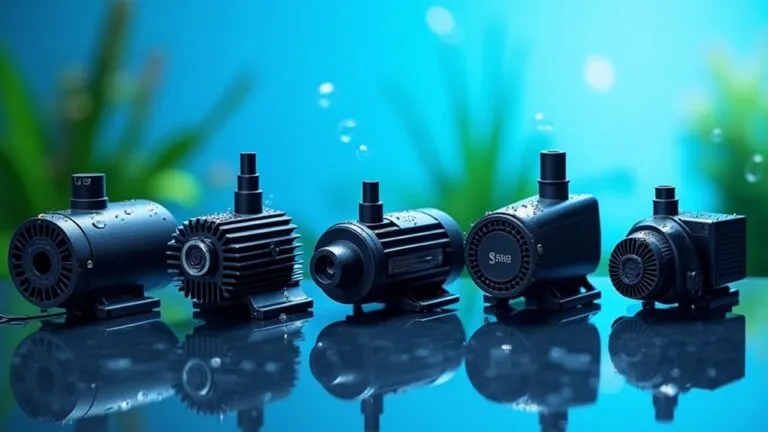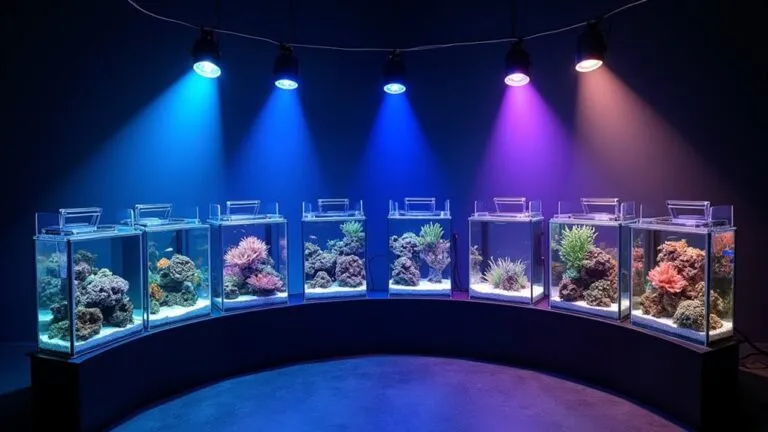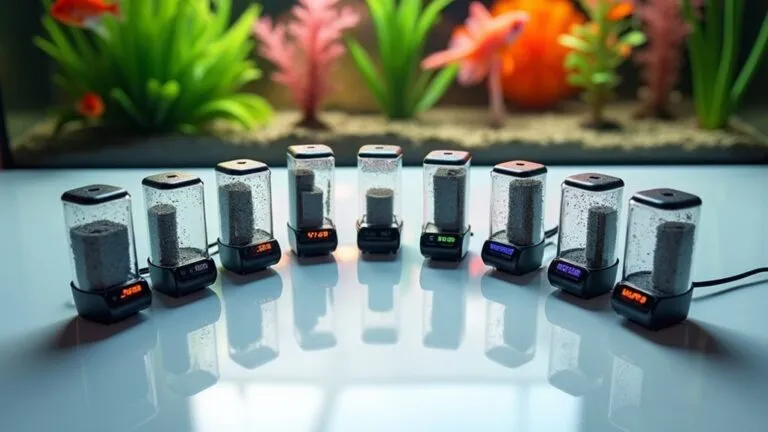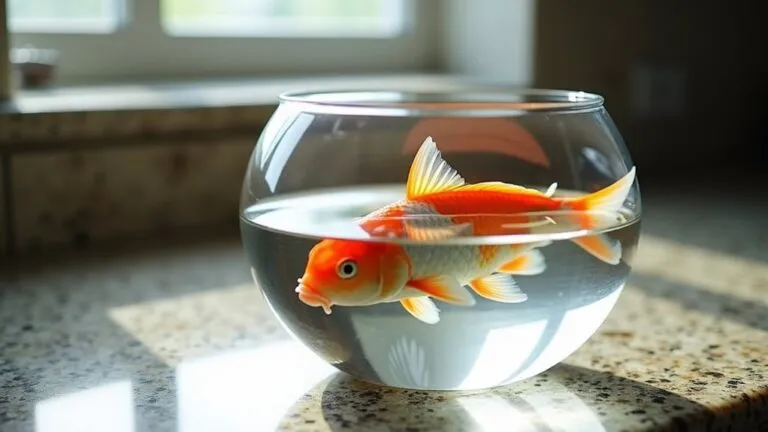Your guppy's lifespan can vary considerably depending on its living conditions. In the wild, these colorful little fish typically survive for 1-2 years due to predators, harsh weather, and environmental challenges. However, when you keep them as pets in a well-maintained aquarium, they'll often live for 2-5 years – more than double their wild counterparts! To help your guppies reach their maximum lifespan, you'll need to maintain proper water conditions, provide a balanced diet, and make sure they have enough space to thrive. There's quite a bit more to keeping these fascinating fish healthy and happy for the long haul.
Contents
Wild Guppy Survival Rates
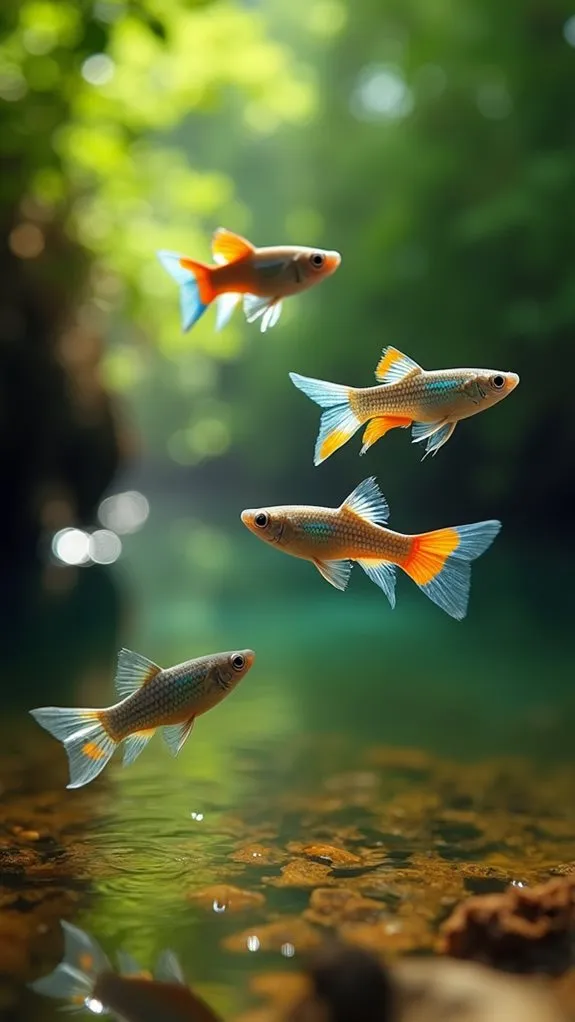
Wild guppies frequently face significant survival challenges due to intense predation and environmental pressures. You'll find these resilient little fish constantly adapting their behavior to stay alive, whether they're swimming in larger groups to confuse predators or becoming more alert to potential threats.
Their survival strategies are quite remarkable, as they've learned to adjust everything from their maturation rate to their reproductive timing. Most wild guppies only have a one to two year lifespan due to these harsh conditions.
When you look at guppy adaptations in high-predation areas, you'll notice they mature faster and have more babies earlier in life – it's their way of ensuring their genes get passed on despite the dangers.
They're also dealing with modern challenges, like warmer waters and murkier conditions caused by urban development, which can make it harder for them to spot approaching predators. Research has shown that guppies in turbid waters tend to spread further apart from their shoal members, making them more vulnerable.
Food availability plays a vital role too. You might be surprised to learn that these clever fish will modify their reproductive strategies based on how much food is around.
When resources are scarce, they'll produce smaller offspring but in greater numbers – talk about a smart survival tactic!
It's fascinating how they've evolved to handle these various pressures in their natural habitat.
Captive Versus Wild Lifespans
You'll notice a striking difference between guppies living in your home aquarium and those swimming freely in the wild, with captive guppies often living twice as long as their wild cousins.
While your pampered pets can thrive for 2-5 years in a controlled environment, wild guppies face constant challenges from predators, harsh weather conditions, and human-caused habitat changes that typically limit their lifespan to just 1-2 years. In a supportive environment, guppies exhibit strong social traits which can also positively influence their health and lifespan.
A diet rich in brine shrimp provides essential nutrients that support their health and longevity.
Your careful tank maintenance and protection from predators make all the difference, proving that a little TLC goes a long way in extending your guppies' lives. Maintaining an optimal temperature range of around 74°F can significantly increase their longevity compared to warmer waters.
Aquarium Care vs. Nature
Throughout their lives, guppies face vastly different survival prospects depending on whether they live in captivity or the wild. In captivity, your guppies can thrive for 3-5 years with proper tank maintenance and stress management, while their wild cousins typically survive only 1-2 years. It's like comparing a luxury hotel to camping in the wilderness!
When you're caring for guppies in an aquarium, you're in control of their environment. You'll need to maintain consistent temperatures between 75-82°F, keep the water quality pristine, and guarantee they're getting a five-star dining experience with varied, high-quality foods. A minimum 10-gallon tank is essential for reducing stress and promoting optimal health. Regular monitoring of tank conditions can help prevent common health issues that might shorten their lifespan, such as ensuring ammonia levels remain at zero.
Regular water changes and testing become your weekly routine, but it's worth it for your finned friends.
Nature isn't nearly as accommodating. Wild guppies must contend with predators, inconsistent food supplies, and unpredictable water conditions. They're constantly playing a survival game without the safety net that captive guppies enjoy.
While wild guppies have developed remarkable resilience, they can't match the longevity of their pampered relatives in home aquariums, where you can provide them with everything they need to live their best lives.
Predation and Environmental Impact
Despite their reputation as hardy fish, guppies show remarkable adaptations to predation that directly affect their lifespans. You'll find it fascinating that guppies from high-predation areas actually develop stronger survival traits – they mature earlier, reproduce more frequently, and maintain their reproductive abilities longer than their low-predation counterparts. In fact, females can produce 20 to 50 offspring in a single reproductive cycle.
Reaching sexual maturity at just 2-3 months allows guppies to quickly establish populations in new environments. When you remove predation effects in lab conditions, these same fish even demonstrate longer lifespans!
In the wild, environmental stress takes a serious toll on guppy longevity. Your backyard pond guppies face challenges like harsh weather, scarce food, and water quality issues that their aquarium cousins don't have to worry about.
But here's the good news: you can help your captive guppies live longer by creating ideal conditions. Keep their water cool and clean, provide high-quality food, and maintain the right male-to-female ratio (one gentleman to two ladies works best – no crowded fish parties!).
These simple steps can greatly extend your guppies' lives beyond what they'd experience in nature, where they're constantly playing a game of survival against predators and environmental challenges.
Optimal Tank Conditions
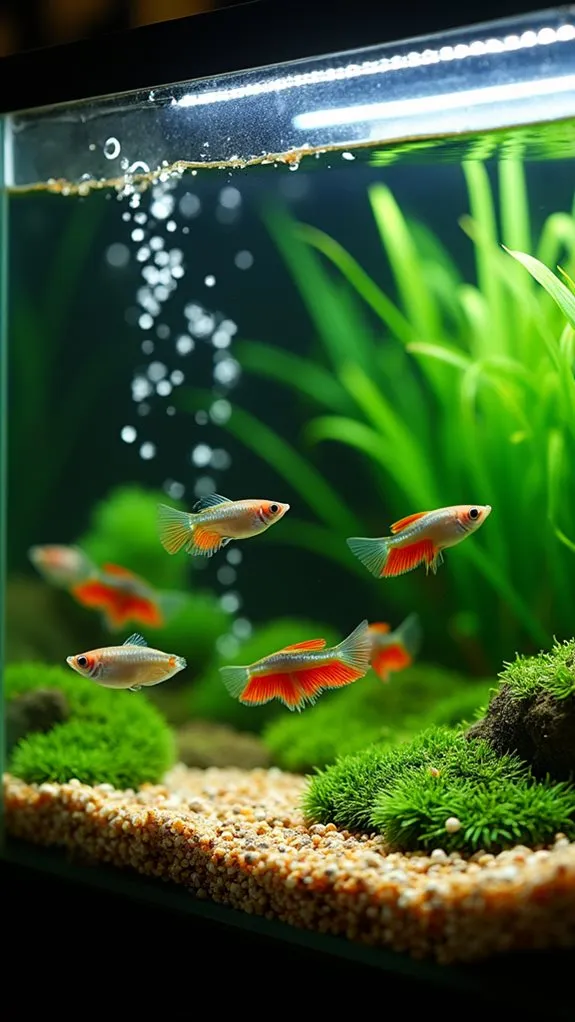
To keep your guppies thriving, you'll need to maintain their tank's temperature between 76-78°F and pH levels between 7.0-8.0, creating that perfect "home sweet home" environment.
Your guppies will love swimming in a spacious tank – start with at least 10 gallons for six fish, though larger tanks make maintenance easier and help prevent overcrowding issues. Limiting tanks to 2-4 guppies in smaller 5-gallon setups helps prevent stress and illness among your fish. Regularly monitoring water parameters is crucial for ensuring a safe habitat for your guppies.
Regular water changes and a reliable filtration system aren't just nice-to-haves, they're essential for keeping your aquatic friends healthy and happy throughout their lives. Maintaining water hardness levels between 8-12 dGH ensures your guppies get the calcium and magnesium they need.
Temperature and Ph Levels
Maintaining proper temperature and pH levels is essential for your guppy's health and longevity.
You'll want to keep your tank's temperature between 72°F and 82°F, with minimal temperature fluctuations throughout the day. When it comes to pH stability, aim for levels between 6.8 and 7.8, as this range closely mimics your guppy's natural habitat.
To help your guppies thrive in their aquatic home, here are the key points you'll need to monitor:
- Install a reliable heater that provides 2.5-5 watts per gallon of water
- Place your heater near the filter for even heat distribution
- Check pH levels weekly using a quality testing kit
- Make gradual adjustments to avoid shocking your fish
- Keep temperature changes within 2°F per day, as stable temperatures are crucial for preventing stress and health complications in tropical fish.
Tank Size Requirements
A properly sized tank serves as the foundation for your guppy's well-being and longevity. If you're just starting out, you'll want at least a 5-gallon tank for 2-3 guppies, though a 10-gallon setup is much better for maintaining stable water conditions and guaranteeing proper guppy compatibility.
Think of it like giving your fish a cozy apartment versus a spacious house – more room means happier swimmers!
For those planning a larger guppy family, consider that a 20-gallon tank can comfortably house 12-13 guppies, while a 40-gallon aquarium supports up to 25 of these colorful swimmers.
Remember, overcrowding isn't just uncomfortable for your fish – it makes tank maintenance much more challenging and can lead to stressed, unhealthy guppies.
You'll want to include plenty of live plants like Java Fern and Anubias, which not only create natural hiding spots but also help maintain water quality. Additionally, a well-cycled tank establishes beneficial bacteria, essential for a healthy environment that supports your guppies' longevity.
When setting up your tank, opt for smooth decorations that won't snag delicate fins, and guarantee there's plenty of open swimming space.
Your guppies will thank you with their active behavior and vibrant displays!
Filtration and Water Quality
High-quality filtration and pristine water conditions form the backbone of your guppy's health and longevity. You'll want to set up reliable filtration systems, like hang-on-back or canister filters, that provide mechanical, biological, and chemical filtration. Remember, guppies aren't Olympic swimmers – they prefer gentle water movement, so don't turn your tank into a whirlpool!
Your guppies will thrive when you maintain proper water parameters, just like how we humans need clean air to breathe. Regular water changes of 10-25% every 2-4 weeks, combined with proper water aeration, keep your finned friends swimming happily. Think of it as giving their home a revitalizing makeover!
Here's what you'll need to monitor regularly:
- pH levels between 7.0 and 7.8 (test weekly)
- Temperature between 72-82°F (avoid sudden changes)
- Water hardness (dGH) between 8-12
- Ammonia and nitrite levels at zero
- Regular filter maintenance schedule
Don't forget to treat new water with a dechlorinator before adding it to your tank – those little guppies are sensitive to chemicals we humans can't even taste! Regular testing for key water parameters like nitrates and nitrites is essential to ensure a safe environment for your guppies.
With consistent maintenance and attention to water quality, you'll create the perfect environment for your guppies to flourish.
Breeding Impact on Longevity
Breeding practices greatly influence a guppy's lifespan through multiple factors, from genetic selection to reproductive stress. When you're selecting guppies for breeding, it's essential to take into account how your breeding techniques might affect their longevity. Expert breeders who focus on maintaining genetic diversity often produce guppies that live longer, sometimes up to three years in well-maintained tanks.
You'll want to pay special attention to your female guppies, as they're particularly affected by breeding stress. Keeping a proper male-to-female ratio (1:2) can help reduce this stress and extend their lives. If you're breeding guppies, you'll notice that frequent pregnancies can take a toll on females, so it's important to give them adequate rest periods between breeding cycles.
The quality of your breeding program also affects future generations. When you select breeding pairs at 6-8 months old, you're potentially overlooking genes that contribute to longevity. Additionally, providing ideal tank conditions enhances overall fish health and can significantly impact their lifespan.
To maximize your guppies' lifespan, combine smart breeding practices with ideal tank conditions and a nutritious diet. Think of it as creating a balanced environment where your fish can thrive rather than just survive.
Common Health Threats
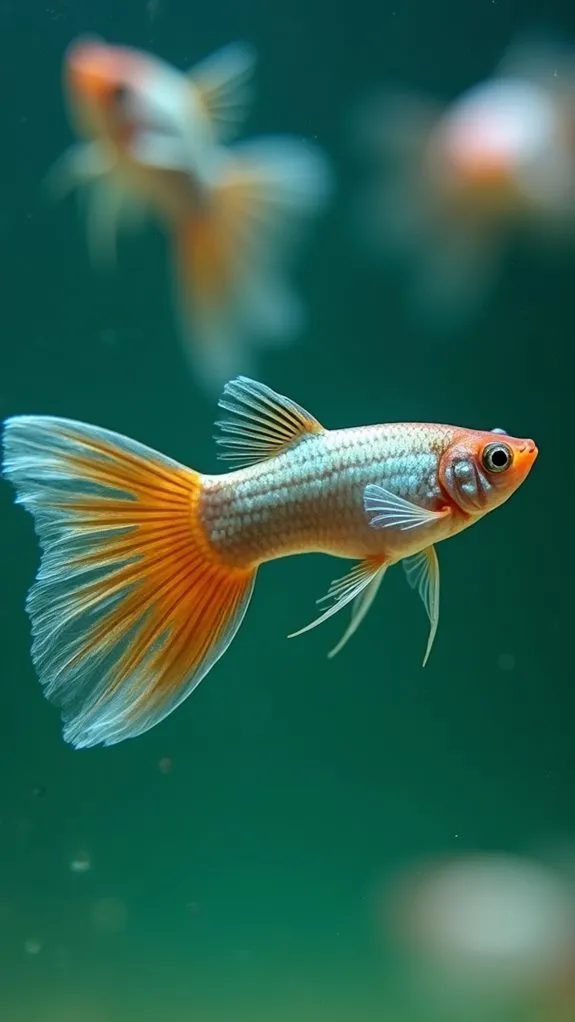
While proper breeding practices help extend guppy lifespans, various health threats can greatly shorten their lives if left unchecked. Your guppies face several potential health challenges, from parasitic infections like ich and velvet disease to bacterial diseases such as dropsy and columnaris.
It's essential to spot these issues early, as they can quickly spread through your tank and affect your entire guppy family. You'll want to keep an eye out for these common warning signs in your guppies:
- White spots or patches appearing on their colorful bodies
- Unusual swimming patterns or difficulty maintaining balance
- Loss of appetite or refusing their favorite foods
- Swollen bodies or raised scales
- Torn or damaged fins and tails
Environmental factors play a huge role in your guppies' health too. Poor water quality, overcrowding, and sudden temperature changes can stress your fish and make them more susceptible to diseases. Maintaining optimal water quality through regular testing is essential for preventing unpleasant odors and ensuring a healthy environment for fish.
That's why maintaining proper tank conditions isn't just about keeping things clean – it's about creating a healthy home where your guppies can thrive and live their fullest lives.
Feeding for Maximum Lifespan
Proper feeding practices can dramatically influence your guppies' lifespan and overall health. The key to successful feeding strategies lies in providing variety – your finned friends need a mix of flakes, pellets, freeze-dried foods, and occasional live treats like blood worms or brine shrimp. They'll even snack on algae when they're feeling peckish!
To maintain ideal nutrient balance, you'll want to feed your guppies 2-3 times daily, but here's the catch: only offer what they can gobble up within 1-2 minutes. Think of it as their own mini fast-food window! Remove any leftovers promptly to keep their water clean and pristine.
Just like you wouldn't want to eat the same meal every day, your guppies appreciate variety in their diet. Additionally, ensuring that they are kept in groups of 5-6 can also enhance their wellbeing, contributing to their lifespan and happiness.
Quality matters as much as quantity when it comes to fish food. Store their food properly, and never use thawed-and-refrozen options – your guppies deserve better!
Water Quality Requirements
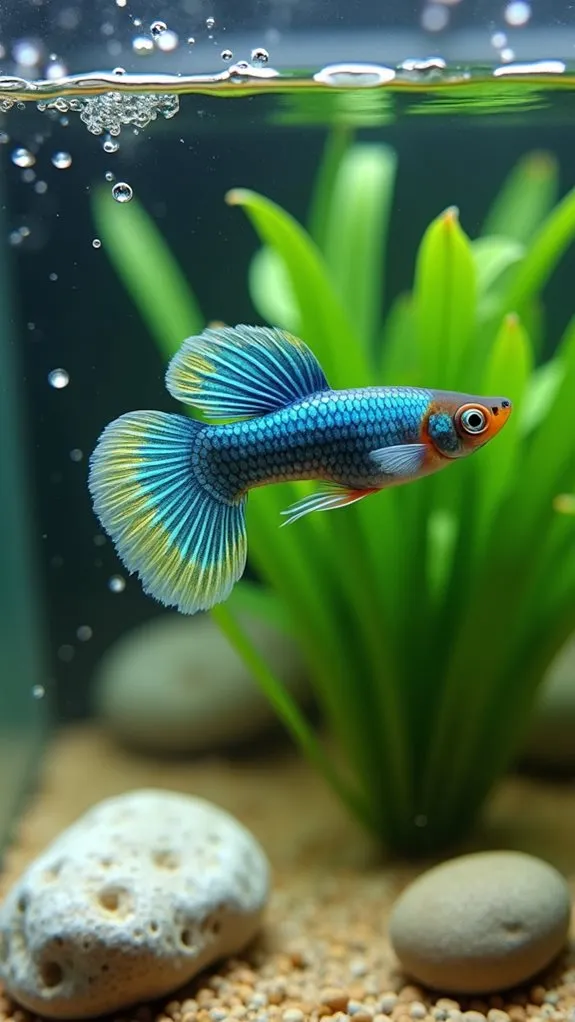
The quality of your guppy's water can make or break their survival chances. Just like you wouldn't want to live in a dirty house, your guppies need clean, well-maintained water to thrive. Proper water chemistry is essential, and you'll need to keep a close eye on temperature, pH levels, and water hardness to guarantee your finned friends stay healthy and active.
When it comes to tank maintenance, you'll want to focus on these vital parameters:
- Keep water temperature between 72-82°F (22-28°C), with 76-78°F being the sweet spot
- Maintain pH levels between 7.0-8.0 for peak health
- Verify water hardness (dGH) stays between 8-12
- Run a reliable filter that doesn't create strong currents
- Change water regularly to keep conditions pristine
Your guppies will thank you for maintaining these conditions by living longer, healthier lives. Remember to test your water parameters regularly – think of it as giving your tank a regular health check-up! Regular water quality tests can help prevent toxic buildup and ensure a balanced ecosystem for your fish.
Adding live plants can help stabilize water conditions naturally, plus they'll give your guppies some fun places to explore and play hide-and-seek.
Genetics and Life Expectancy
Genetics play an essential role in determining how long your guppies will live. Just like how you might inherit your grandmother's curly hair, guppies inherit traits from their parents that affect their health, disease resistance, and overall lifespan.
If you're getting your guppies from expert breeders who prioritize healthy genetics, you're already giving your fish a better chance at a longer life.
One interesting aspect you'll want to contemplate is genetic diversity. When there's a good mix of genetic traits in a population, guppies tend to be hardier and more resistant to diseases.
However, selective breeding practices in the pet trade often focus on creating the prettiest colors and fanciest fins, sometimes at the expense of the fish's health and longevity. It's like choosing style over substance!
You might notice that guppies from different sources have varying lifespans. This isn't just coincidence – it's their genetics at work.
Some populations have adapted to survive longer, while others might mature faster but have shorter lives. When you're choosing guppies, remember that good genes can make a big difference in how long your finned friends will stick around.
Frequently Asked Questions
Can Guppies Recognize Their Owners and Show Affection?
Your guppy won't recognize you specifically or show affection like other pets. While they can respond to familiar stimuli through learned guppy behavior, owner interaction is limited to basic responses to movement and feeding.
Do Guppies Sleep, and How Can You Tell When They're Sleeping?
Yes, guppies sleep in short bursts throughout the day. You'll notice their sleep patterns when they're less active, resting near the bottom or plants, with still fins and duller colors—key indicators of guppy behavior.
Why Do Some Guppies Change Colors as They Age?
Your guppy's color changes are primarily due to age factors, genetics, and development. As they mature, you'll notice their colors becoming more vibrant, especially in males who develop faster than females.
Can Guppies Live Alone or Do They Get Lonely?
You shouldn't keep guppies alone as they need companionship to thrive. Their natural behavior requires social interaction, and they'll become stressed when isolated. Keep at least 4-6 guppies together for ideal well-being.
Do Guppies Make Sounds or Communicate With Each Other Underwater?
No, your guppies don't make sounds underwater. Instead, they rely entirely on visual communication through body movements and colorful displays. They'll use these underwater signals to interact, establish dominance, and attract mates.
Final Thoughts
You'll find that with proper care, your guppies can live between 2-3 years in captivity, though they'll need your dedicated attention to reach their full potential. By maintaining clean water, providing a balanced diet, and keeping stress levels low, you're giving your colorful friends their best shot at a long, healthy life. Remember, while wild guppies typically live shorter lives, your home aquarium can be the perfect setting for these vibrant little swimmers to thrive.

